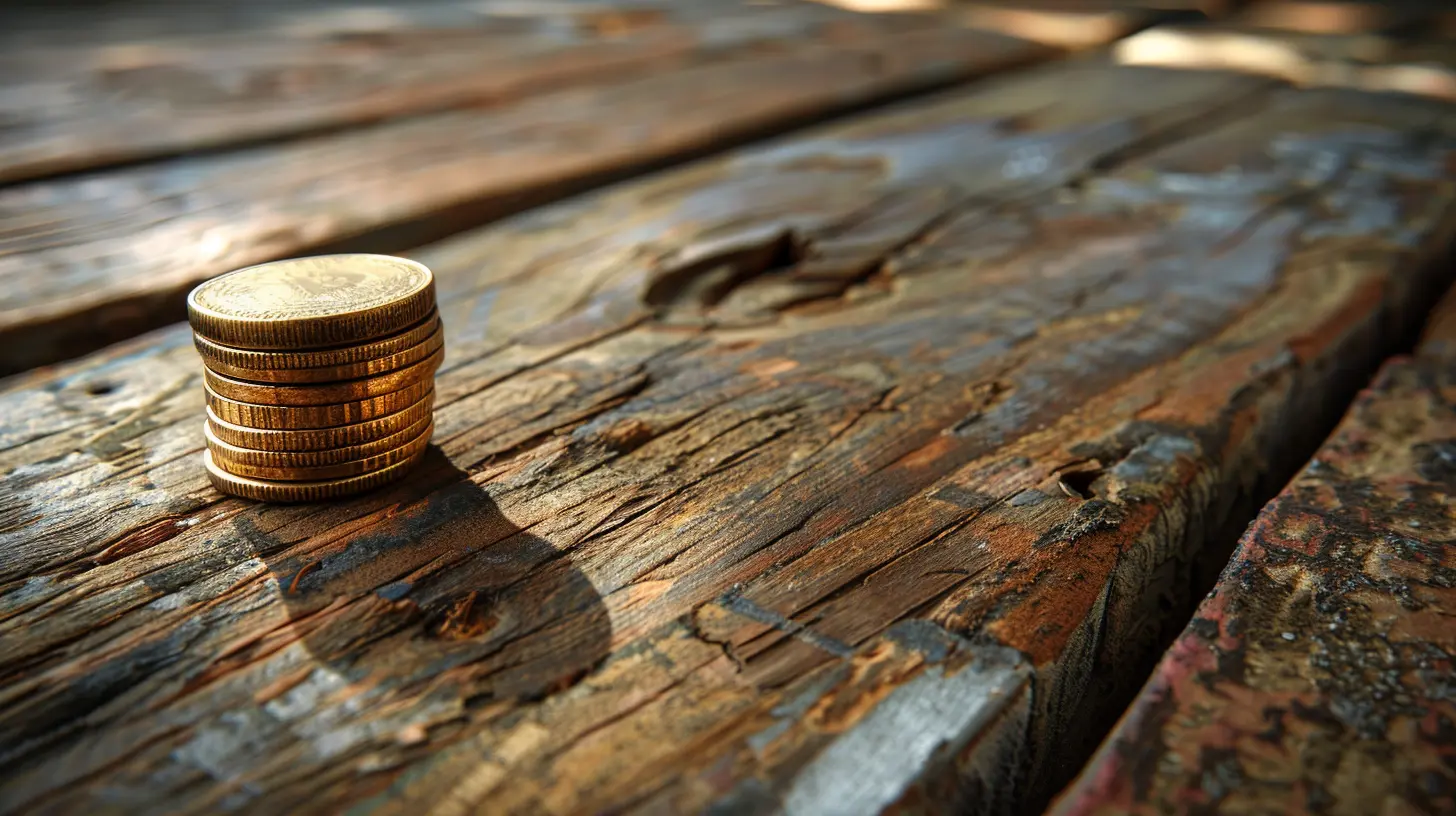Building an Emergency Fund: The Key to Financial Stability
29 November 2024
Life has an annoying habit of throwing curveballs when you least expect it. Your car breaks down on your way to work, a sudden medical bill leaves your wallet gasping for breath, or, worse, you unexpectedly lose your job. It’s times like these when having an emergency fund can be your financial superhero. Think of it as a financial safety net you can fall back on when life throws you off balance.
But building an emergency fund isn’t just about stashing some cash under your mattress (we're not living in the 1800s, folks!). It’s about creating a secure financial cushion that ensures you’re not sent spiraling into debt when the unexpected happens. Let’s dive into why an emergency fund is crucial and, more importantly, how you can build one without feeling overwhelmed. 
Why You Need an Emergency Fund: The Big Picture
Unexpected Expenses Are... Inevitable
Ever heard the phrase “expect the unexpected”? Life doesn’t come with a warning label. Your dog might swallow socks (yep, expensive vet bills!), or your roof might start leaking during a thunderstorm. Without an emergency fund, these surprise expenses can derail your finances faster than you can say "credit card debt."An emergency fund acts like a financial umbrella. Sure, you hope it doesn’t rain—but when it does, you’ll be glad you have it.
Avoiding Debt: Your Future Self Will Thank You
Let’s be real: without savings, most people turn to credit cards or personal loans in emergencies. While it might feel like a quick fix, it often leads to a vicious cycle of debt. High-interest rates and repayment pressures can leave you worse off than when you started. An emergency fund is your antidote to this problem—it lets you handle emergencies without relying on borrowed money.Stress? What Stress?
Money problems are a huge source of stress. Worrying about how you’ll pay for an unexpected bill can keep you up at night, make you cranky, and even impact your health. Knowing you have a financial buffer can bring peace of mind. It’s like hitting snooze on life’s financial alarms.
How Much Should You Save in Your Emergency Fund?
This is the million-dollar question (well, hopefully not literally). The “ideal” emergency fund size depends on factors like your lifestyle, income, and job stability. However, experts generally recommend saving three to six months’ worth of living expenses.Wait, Why Three to Six Months?
If you work in a stable job with a consistent income, three months might cut it. But if you’re self-employed or work in an industry prone to layoffs, aim for six months (or even more). Think of it like insurance: you hope you won’t need it, but it’s better to be over-prepared than underprepared.Let’s Break It Down
- Calculate your monthly expenses. Include essentials like rent/mortgage, utilities, groceries, insurance, and minimum debt payments.- Multiply that figure by three (or six if you want a more robust safety net). This is your savings goal.
For example, if your monthly expenses are $2,500, your emergency fund should be somewhere between $7,500 and $15,000. Sounds like a lot? Don’t panic—we’ll get to the “how” in just a bit.
Steps to Building an Emergency Fund
1. Start Small, But Start Now
Don’t fall into the trap of thinking you need thousands of dollars saved right away. The key is to start small. Even saving $20 or $50 a week can add up over time. The magic of compounding works in your favor when you’re consistent.Ask yourself: What small expenses can I cut back on? Maybe it’s skipping that overpriced latte a few times a week or cooking at home instead of ordering takeout. Small sacrifices today can lead to big wins tomorrow.
2. Open a Dedicated Savings Account
Keeping your emergency fund separate from your regular checking account is crucial. Why? It reduces the temptation to dip into it for non-emergencies. Consider opening a high-yield savings account so your money earns interest while it sits there. It’s like getting a tiny bonus for being financially responsible.3. Automate Your Savings
We humans are creatures of habit. Setting up automatic transfers to your emergency fund is like putting your savings on autopilot. You won’t even have to think about it—it’ll grow behind the scenes while you binge-watch your favorite TV shows. Aim to transfer a fixed percentage of your paycheck (maybe 10%) into your savings account every month.4. Prioritize Your Emergency Fund
It can be tempting to focus on paying off debt first, but your emergency fund should still be a top priority. Why? Without it, you’re at risk of falling deeper into debt when the unexpected happens. Strike a balance—allocate some money toward debt repayments and the rest toward your savings.5. Stash Windfalls
Got a tax refund, work bonus, or birthday cash? Instead of splurging on that new gadget or vacation, funnel it straight into your emergency fund. This is an easy way to make significant progress without impacting your regular budget.6. Cut Back Temporarily
If reaching your savings goal feels impossible, consider trimming your budget temporarily. Cancel unused subscriptions, shop smarter, or find free entertainment options. Yes, it’s a sacrifice—but remember, it’s temporary, and the payoff is worth it.
When to Use Your Emergency Fund (Spoiler: Not for That New TV)
True Emergencies Only
An emergency fund is for—wait for it—emergencies. That means:- Medical bills not covered by insurance
- Unexpected car repairs
- Job loss
- Emergency home repairs (e.g., a burst pipe or broken furnace)
It’s not for vacations, holiday shopping, or upgrading to the latest smartphone. Think of it like an “in case of financial emergency, break glass” fund.
Replenish After You Use It
If you dip into your emergency fund (and that’s okay—it’s what it’s there for!), make it a priority to replenish it as soon as possible. Go back to your regular savings plan until you’ve rebuilt your cushion.Common Mistakes to Avoid
1. Not Starting At All
The biggest mistake? Doing nothing. Even if you’re saving just $5 a week, it’s better than saving nothing. Progress is progress, no matter how small.2. Dipping Into It for Non-Essentials
Using your emergency fund for something that isn’t a true emergency is like eating someone else’s leftovers—it’s just not right. Train yourself to leave the fund untouched unless it’s an actual crisis.3. Underestimating How Much You Need
It’s better to aim high. Life is unpredictable, and the last thing you want is to discover your emergency fund isn’t enough when you need it most.Final Thoughts: Why an Emergency Fund is Non-Negotiable
Building an emergency fund is like giving yourself a financial superpower. It won’t prevent life’s surprises, but it’ll make sure they don’t knock you down for the count. The peace of mind you’ll gain is priceless—and trust me, your future self will thank you.So, start today. Even if your savings goal feels overwhelming, remember that every little bit counts. Your emergency fund is your financial safety net, and building it is one of the smartest moves you can make for long-term stability.
all images in this post were generated using AI tools
Category:
Emergency FundAuthor:

Knight Barrett
Discussion
rate this article
19 comments
Ashira McDowney
What a fantastic read! Building an emergency fund is like creating a financial safety net, bringing peace of mind and joy. Knowing you’re prepared for unexpected expenses can truly transform your outlook on life. Here’s to securing our futures with a little planning and optimism! 🎉✨
February 12, 2025 at 11:30 AM

Knight Barrett
Thank you for your thoughtful comment! I’m glad you found the article valuable—building an emergency fund is indeed a crucial step towards financial security and peace of mind. Cheers to a brighter, more secure future! 🎉✨
Micah McCarron
An emergency fund is essential; it transforms financial anxiety into stability and confidence.
February 4, 2025 at 9:35 PM

Knight Barrett
Absolutely! An emergency fund is a vital step towards achieving financial peace of mind and resilience.
Velma Bowman
Saving for emergencies...like adulting-level 2!
January 30, 2025 at 8:01 PM

Knight Barrett
Absolutely! Building an emergency fund is a crucial step toward achieving financial independence and security. Keep up the great adulting!
Aubrey Barker
Great article! Building an emergency fund is something I've learned to value deeply. It really brings peace of mind and a solid foundation for financial stability. Thank you for sharing such important insights on this topic!
January 28, 2025 at 1:55 PM

Knight Barrett
Thank you for your kind words! I'm glad you found the article helpful. Building an emergency fund truly is essential for peace of mind and financial stability.
Marni McCracken
Emergency fund: because pizza emergencies happen!
January 23, 2025 at 12:52 PM

Knight Barrett
Absolutely! An emergency fund can cover unexpected expenses—like those pizza cravings that just can't wait! 🍕
Zayne Kane
Great article! Building an emergency fund is essential for financial stability and peace of mind. It empowers us to face unexpected challenges without stress. Thank you for sharing these valuable insights—let’s prioritize our financial wellness together! Looking forward to more tips!
January 19, 2025 at 8:32 PM

Knight Barrett
Thank you for your kind words! I'm glad you found the insights helpful. Prioritizing financial wellness is crucial, and I look forward to sharing more tips with you!
Elowen Foster
Building an emergency fund is crucial for financial stability, offering a safety net during unexpected situations. While it requires discipline and planning, the peace of mind it provides is invaluable. Establishing a fund tailored to individual needs can be a transformative step towards long-term financial security.
January 13, 2025 at 8:20 PM

Knight Barrett
Thank you for your insightful comment! I completely agree—an emergency fund is essential for peace of mind and financial security.
Zinnia Snyder
An emergency fund is your safety net—start building it today!
January 9, 2025 at 12:42 PM

Knight Barrett
Absolutely! An emergency fund is essential for financial security and peace of mind—start saving today to protect your future!
Yasmeen Lambert
Great article! Building an emergency fund is such a vital step towards achieving financial stability. It not only provides a safety net during unexpected situations but also offers peace of mind. Thank you for highlighting its importance and offering practical tips to make this process easier!
January 7, 2025 at 9:12 PM

Knight Barrett
Thank you for your kind words! I'm glad you found the article helpful. Building an emergency fund truly is a crucial step toward financial stability.
Bradley McVicker
Security breeds financial confidence.
January 2, 2025 at 3:24 AM

Knight Barrett
Absolutely! A solid emergency fund provides a safety net that enhances financial security and fosters greater confidence in managing unexpected expenses.
Soryn Taylor
An emergency fund is like an insurance policy for your peace of mind. It transforms panic into preparation, ensuring that when life throws curveballs, you can hit them out of the park without financial strain. Start saving today!
December 26, 2024 at 7:24 PM

Knight Barrett
Absolutely! An emergency fund is essential for financial stability, providing peace of mind and a buffer against unexpected expenses. Start saving now!
Sandra Hahn
In the shadows of financial chaos lies a powerful ally: the emergency fund. Often overlooked, it is the silent guardian that transforms uncertainty into stability. What secrets does it hold for those brave enough to embrace its potential? Discover the hidden strength behind a well-structured safety net.
December 23, 2024 at 12:15 PM

Knight Barrett
Thank you for highlighting the crucial role of an emergency fund! It truly serves as a financial safety net, providing peace of mind and security in times of uncertainty. Embracing its potential is essential for achieving long-term stability.
Isaiah Potter
An emergency fund isn't just a nice-to-have; it’s a financial lifeline. Too many ignore this critical step, opting for short-term gains instead. If you’re serious about true financial stability, prioritize an emergency fund. It’s your safety net against life's unpredictability—stop making excuses and start saving now!
December 17, 2024 at 3:36 AM

Knight Barrett
Absolutely agree! An emergency fund is essential for long-term financial stability and peace of mind. Prioritizing it ensures you're prepared for life's unexpected challenges. Start saving today!
Hesper McCracken
Establishing an emergency fund is essential for financial resilience; it not only provides a safety net during unforeseen events but also promotes disciplined savings habits.
December 13, 2024 at 7:49 PM

Knight Barrett
Thank you for your insightful comment! I completely agree—an emergency fund is crucial for both security and cultivating healthy savings habits.
Indie Willis
Establishing an emergency fund is essential for achieving financial stability. It acts as a safety net during unexpected circumstances, reducing reliance on credit and preventing debt. Start by saving a small, consistent amount each month to build your fund and secure your financial future.
December 4, 2024 at 12:22 PM

Knight Barrett
Thank you for highlighting the importance of an emergency fund! Your insights on starting small and saving consistently are key to achieving long-term financial stability.
Rosalie Hahn
Essential for unexpected expenses.
December 1, 2024 at 7:45 PM

Knight Barrett
Absolutely! An emergency fund is crucial for handling life's surprises without financial strain.
Buzz McSweeney
Oh sure, an emergency fund—because who wouldn't want to stash away money for those totally unexpected expenses like car repairs, medical bills, or, you know, a surprise taco truck visit? Priorities, folks! Let’s just cross our fingers instead!
December 1, 2024 at 4:21 AM

Knight Barrett
While it may seem amusing, an emergency fund is essential for handling life's unpredictabilities—taco truck cravings included! Prioritizing savings ensures you're prepared for both expected and unexpected expenses.
Eliza Hernandez
Absolutely agree! An emergency fund is like a safety net for your finances. It brings peace of mind, allowing you to tackle life’s surprises without stress. Let’s all prioritize building that cushion!
November 30, 2024 at 1:45 PM

Knight Barrett
Thank you! I completely agree—an emergency fund truly is essential for financial peace and stability.
Patricia McCallum
Great insights! An emergency fund truly is essential for financial stability. It provides peace of mind and a safety net during unexpected situations.
November 29, 2024 at 9:21 PM

Knight Barrett
Thank you! I'm glad you found it insightful. An emergency fund really is a vital step toward achieving financial security.
MORE POSTS

Shifting from a Fixed Mindset to a Growth Money Mindset

How to Optimize Your Capital Gains in a Tax-Advantaged Account

The Paradox of Choice: Why More Financial Options Aren't Always Better

Student Loan Forgiveness: Myth vs. Reality

How Consistency in Investing Can Lead to Financial Freedom

Best Financial Tools to Help You Manage an Emergency Fund

Best Practices for Managing Small Business Expenses

Passive Income Tax Strategies: Keeping More of What You Earn

The Benefits of Starting Wealth Management Early in Life

Essential Tips for Budgeting and Saving as a Freelancer

How Inflation Impacts Wealth Preservation

Why Monitoring Household Debt is Crucial for Long-Term Economic Forecasts